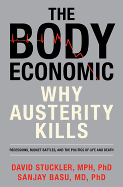
The recent global recession has been talked about in terms of credit availability, budget deficits and public service costs, but few have mentioned its extraordinary effects on human health. In The Body Economic, David Stuckler and Sanjay Basu lay out in stark terms what the recession and the economic policies chosen to deal with it have done--or failed to do--for human health in countries around the world.
Stuckler and Basu demonstrate that a recession, in and of itself, is neither entirely good nor entirely bad for human health. What matters more is whether a government facing recession chooses to continue supporting social safety net programs or to eliminate them in the name of "austerity." In Russia, for example, post-Soviet austerity measures may have claimed the lives of as many as 20 million people. Iceland, however, saw no statistically significant increases in mortality or disease rates after its banking sector imploded in the 2007 financial crisis--because it maintained its public health system even when doing so meant repaying creditors more slowly.
Throughout the book, Stuckler and Basu rely on economic studies, most of them subjected to peer review, to underline a critical point: public health is economic health. Far from being the "luxury" the IMF categorizes it as, public health spending is in fact necessary to the economic recovery of a country in recession. The Body Economic makes the point in stark and accessible terms. --Dani Alexis Ryskamp, blogger at The Book Cricket

